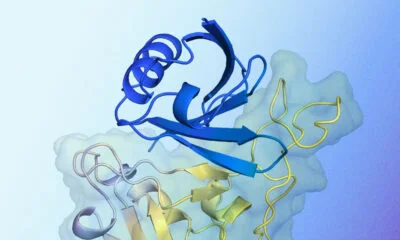News
Abu Dhabi Scientists Create Electronic Appetite Regulation Pill
The tiny device utilizes electrodes to stabilize and regulate the gut-brain axis, which can help control appetite and treat several diseases.

A research team from NYU Abu Dhabi (NYUAD), overseen by Professor Khalil Ramadi, has created a groundbreaking “ingestible electroceutical device” known as the FLASH system. The pill-shaped device modulates the signaling pathway between the digestive tract and the central nervous system and is administered like a regular ingestible capsule tablet.
Featuring surface electrodes that deliver stimulation to the stomach’s mucosal tissues, the non-invasive device bypasses gastric acids to achieve direct electrode-to-tissue contact. The ingestible pill is powered by tiny batteries, delivering stimulation for around 20 minutes before being excreted by the body — a process that can take up to two weeks, depending on the size of the human or animal test subject.

“FLASH is one of the first ingestible electroceuticals that can regulate precise neurohormonal circuits while avoiding the discomfort patients can experience with invasive treatments,” says Professor Khalil Ramadi, NYU Abu Dhabi.
Researchers on the FLASH project were inspired by the unique skin surface properties of the Australian Thorny Devil Lizard, whose skin can efficiently wick away surface moisture. The pill replicates this process by using grooved surface patterns and hydrophilic properties that enable it to be ingested and excreted without side effects.
Also Read: Sultan Al Neyadi Becomes The First Ever Arab To Spacewalk
During testing, scientists noted that the capsule modulated the release of the hormone ghrelin, which the body uses to stimulate hunger. Regular hormone medications have poor bioavailability in oral form, requiring an injection to administer. The FLASH system, on the other hand, can target very specific gastric-hormonal pathways through simple oral administration.
The FLASH pill shows promise against a wide range of diseases, including metabolic, gastrointestinal, and neuropsychiatric disorders. Unfortunately, the device requires further preclinical testing before being ready for the public market. However, the development team has set a goal of creating an advanced prototype for human trials within five years.
News
HiFuture Wraps Up Successful GITEX GLOBAL 2024 Appearance
The electronics company wowed audiences at the world’s largest tech event with a range of wearable and smart audio devices.

This year’s GITEX GLOBAL 2024 in Dubai saw a huge number of startups, electronics firms, and innovators from around the globe gather for the tech sector’s largest event of its kind. One company making waves at this year’s expo was Chinese tech group HiFuture, which showcased a range of products with a focus on wearable technology and smart audio.
At the HiFuture booth, the company captivated attendees with cutting-edge smartwatches like the ACTIVE and AURORA, along with a range of powerful wireless speakers, earbuds, and even smart rings. Visitors were eager to check out the sleek new designs on offer and even had the chance to test out some of the products themselves.

Among the highlights were smartwatches combining dual-core processors with customizable options. The devices blended style and technology, offering health monitoring capabilities, personalized watch faces, and advanced AI-driven functionalities, giving attendees a taste of the future of wearable technology.
On the audio front, HiFuture’s wireless speakers left a lasting impression, offering rich, immersive sound in compact, portable designs. These speakers cater to both intimate gatherings and larger celebrations, offering versatility for users. Meanwhile, the company also showed off its Syntra AI technology, which it claims “revolutionizes health and fitness tracking by combining advanced optical sensors with intelligent algorithms for precise, real-time insights”.
Also Read: How (And Why) To Start A Tech Business In Dubai
The presence of HiFuture’s leadership team at GITEX 2024 underscored the importance of this event for the company, with CEO Levin Liu leading a team of executives, all keen to engage with attendees and offer insights into HiFuture’s vision, product development process, and future direction.
Overall, it seems that GITEX GLOBAL 2024 has been a rewarding experience for HiFuture. The enthusiasm and curiosity of attendees shown to the company’s diverse range of products was obvious, with the HiFuture team leaving on a high note and clearly excited and motivated by the event.




























